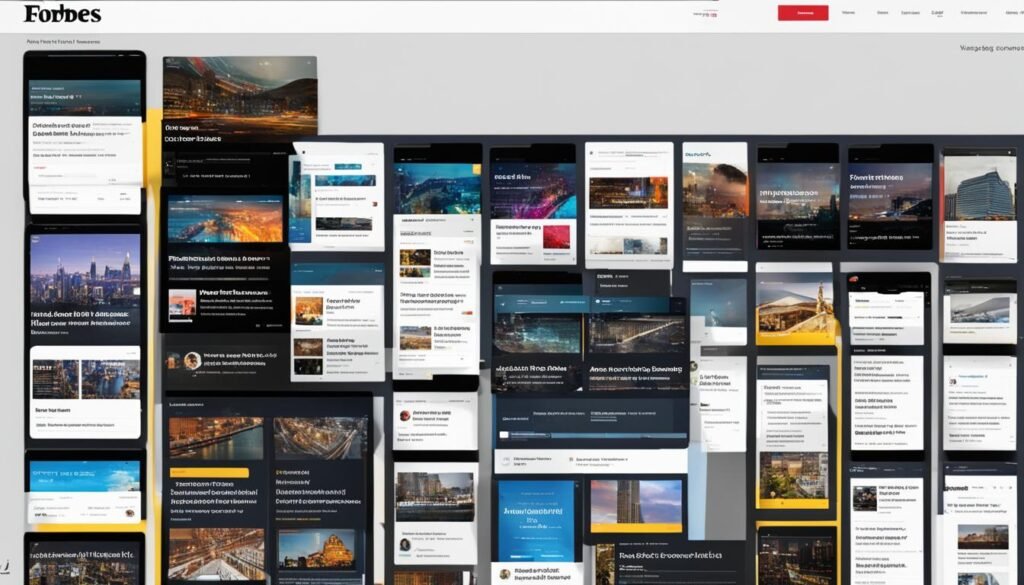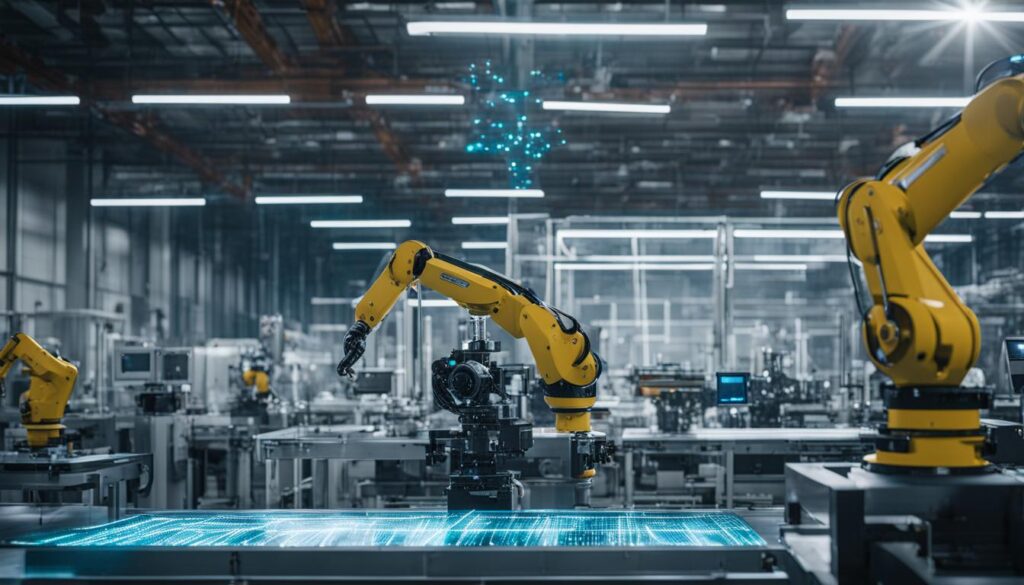Artificial Intelligence (AI) has become a driving force in shaping our world, revolutionizing various industries and transforming the way we live and work. In this article, we will delve into the applications and impact of AI technology, offering insights into the exciting future that lies ahead.
AI technology has the potential to revolutionize industries such as healthcare, finance, education, entertainment, autonomous vehicles, and retail. With advancements in natural language processing, machine learning, and deep learning, AI is set to become an integral part of our daily lives, enhancing efficiency and accuracy in various tasks.
Key Takeaways:
- The future of AI holds endless possibilities for innovation and progress.
- AI technology is reshaping industries such as healthcare, finance, education, entertainment, autonomous vehicles, and retail.
- Advancements in natural language processing, machine learning, and deep learning are driving the growth of AI.
- Diverse perspectives and collaboration are crucial in shaping the future of AI.
- AI is expected to have a significant impact on our everyday lives, improving efficiency and overall quality.
Kamala Harris: A Surprising Force in AI
Kamala Harris, the Vice President of the United States, has surprisingly shown deep interest and understanding of AI. She is set to deliver a speech at an AI summit in London, exploring the intersectionality of AI and governance. Her involvement highlights the importance of diverse perspectives in shaping the future of AI.
As a prominent political figure, Kamala Harris brings a unique perspective to the discussion surrounding AI. Her background in law and governance equips her to understand the ethical and social implications of AI technology. With her speech at the AI summit, Harris aims to shed light on the intersectionality of AI and governance, emphasizing the need for responsible and inclusive AI policies.
“AI has the potential to both revolutionize and disrupt various industries, making it imperative for policymakers to actively engage in the conversation. By understanding the potential risks and benefits of AI, we can shape policies that foster innovation while safeguarding against unintended consequences. It is a collective effort that requires collaboration, diversity, and ethical considerations.”
– Kamala Harris
Harris’ involvement in the AI summit also underscores the importance of diversity in shaping the future of AI. By encouraging diverse voices and perspectives, we can ensure that AI technologies are developed with fairness, inclusivity, and social impact in mind.
Key Takeaways:
- Kamala Harris, the Vice President of the United States, has shown keen interest in AI and will be speaking at an AI summit in London.
- Harris aims to explore the intersectionality of AI and governance, highlighting the importance of responsible and inclusive AI policies.
- Her involvement emphasizes the need for diverse perspectives in shaping the future of AI.
Forbes Launches AI-Powered News Search Tool
Forbes, renowned for its cutting-edge approach to news and information, has recently introduced Adelaide, an innovative AI-powered news search tool. This state-of-the-art tool is powered by Google Cloud and generative AI, showcasing Forbes’ commitment to harnessing the potential of artificial intelligence in enhancing the news consumption experience.
Adelaide takes personalized content recommendations to new heights, providing visitors with an intuitive and tailored news discovery journey. By leveraging the power of generative AI, Forbes has created a tool that understands user preferences and interests, delivering relevant and engaging content at the click of a button. With Adelaide, readers can easily explore a wide range of news articles curated to match their individual needs and preferences.
Forbes’ introduction of Adelaide demonstrates the magazine’s dedication to remaining at the forefront of technological innovation. By utilizing AI technology, Forbes continues to evolve and adapt to the ever-changing landscape of digital media. The launch of Adelaide represents a significant step forward in Forbes’ mission to provide its audience with a seamless and personalized news experience.
Key Features of Adelaide:
- Personalized content recommendations based on user preferences.
- Intuitive and user-friendly interface for effortless news discovery.
- Generative AI technology delivering relevant and engaging content.
- Seamless integration with Google Cloud for enhanced performance.
With Adelaide, Forbes has raised the bar for personalized news consumption, making it easier for readers to explore a breadth of content tailored to their interests. As the digital landscape continues to evolve, Forbes remains committed to leveraging AI technology to provide enhanced news experiences that captivate and engage its audience.
Applications of AI: Reshaping Industries
Artificial Intelligence (AI) technology is revolutionizing various industries, transforming the way they operate and creating new possibilities. Let’s explore some of the key applications of AI in different sectors:
1. AI in Healthcare
AI is making significant contributions to the healthcare industry, improving patient care and outcomes. In medical imaging, AI algorithms can analyze and interpret diagnostic images, aiding in the early detection of diseases like cancer. AI also plays a crucial role in drug discovery, assisting researchers in identifying potential drug candidates and speeding up the development process. Additionally, AI enables personalized medicine by analyzing patient data to determine the most effective treatment plans. It is also utilized for health monitoring, predicting disease progression, and identifying patients at risk.
2. AI in Finance
The finance industry is leveraging AI to enhance efficiency, accuracy, and security. AI-powered algorithms drive algorithmic trading, making data-driven decisions in split seconds and enabling rapid execution of trades. AI is also used for fraud detection, analyzing patterns and anomalies in transactions to identify fraudulent activities. In credit scoring, AI models assess the creditworthiness of individuals or businesses by analyzing various data points. Customer service in the finance sector has also been improved with the use of AI-powered chatbots.
3. AI in Education
AI has the potential to revolutionize education by personalizing learning experiences and improving educational outcomes. Intelligent systems can adapt to individual student needs, providing personalized recommendations and adaptive learning paths. AI-powered platforms can automate grading and provide instant feedback, saving teachers valuable time. Intelligent tutoring systems utilize AI algorithms to provide personalized instruction and support to students. Learning analytics, powered by AI, can analyze student data to identify trends, gaps in knowledge, and areas for improvement.
4. AI in Entertainment
The entertainment industry benefits from AI technology in various ways. AI-driven content recommendation systems analyze user preferences and behavior to provide personalized recommendations, enhancing the user experience. In the realm of video games, AI powers intelligent game characters, enabling realistic and dynamic gameplay. AI algorithms are also used in music composition, generating original compositions or assisting musicians in creating new melodies. In the field of visual effects, AI is employed to create stunning and realistic CGI elements.
5. AI in Autonomous Vehicles
The development of autonomous vehicles heavily relies on AI technology. AI enables object detection and recognition, allowing vehicles to detect and respond to their surroundings. Path planning algorithms utilize AI to determine the optimal route for the vehicle, taking into account various factors such as traffic, road conditions, and safety. Advanced driver assistance systems (ADAS) use AI to assist drivers in tasks like lane keeping, adaptive cruise control, and collision avoidance.
6. AI in Retail
Retailers are utilizing AI to enhance various aspects of their operations, ultimately improving customer experience and driving sales. AI-powered inventory management systems can optimize stock levels, minimizing out-of-stock situations and reducing overstocking. Chatbots equipped with AI algorithms provide personalized customer service, answering inquiries and assisting with purchase decisions. Visual search technology, powered by AI, enables users to search for products by uploading images, making the shopping experience more convenient. AI algorithms are also leveraged for pricing optimization, dynamically adjusting prices based on market trends and demand.
In conclusion, AI is transforming industries, revolutionizing the way businesses operate and improving various aspects of our everyday lives. From healthcare to finance, education to entertainment, autonomous vehicles to retail, AI technology continues to reshape our world, providing innovative solutions and unlocking new possibilities.
The Future of AI
As we look ahead, the future of AI holds immense potential to transform various aspects of our lives. The rapid advancements in AI technology are paving the way for emerging AI trends that will shape our society in profound ways. From natural language processing to deep learning and smart algorithms, these trends are poised to revolutionize industries and redefine our everyday experiences.
One of the key areas where AI is expected to have a significant impact is healthcare. AI-powered medical imaging can improve diagnostic accuracy and enable early detection of diseases. Additionally, personalized medicine based on AI algorithms can revolutionize treatment plans by tailoring them to individual patients’ genetic profiles and medical history.
In finance, AI-driven algorithms are already playing a crucial role in automating trading strategies, fraud detection, and customer service. AI-powered chatbots provide personalized financial advice and support, enhancing the overall customer experience. With further advancements, AI has the potential to make financial services more accessible, efficient, and secure.
The Impact on Everyday Life
AI’s impact on everyday life extends beyond specific industries. It has the potential to revolutionize transportation with the advent of autonomous vehicles. From self-driving cars to improved traffic management systems, AI can make transportation safer, more efficient, and reduce environmental impact.
Moreover, AI-powered virtual assistants are becoming increasingly integrated into our daily routines, simplifying tasks and providing personalized recommendations. Whether it’s voice-activated smart speakers or AI-driven personal assistants on our smartphones, these technologies are transforming the way we communicate, consume information, and manage our daily lives.
In conclusion, the future of AI is bright and full of possibilities. As AI technology continues to evolve, it will reshape industries, improve healthcare outcomes, optimize financial services, and enhance our everyday experiences. The emerging AI trends will bring about innovative solutions, making our lives more convenient, efficient, and connected. Embracing these advancements and harnessing the power of AI will undoubtedly propel us into a future where technology works in harmony with human potential.
The Significance of AI Expertise and Collaboration
When it comes to the field of Artificial Intelligence (AI), expertise plays a crucial role in driving innovation and progress. AI experts possess the knowledge and skills required to develop cutting-edge algorithms, analyze complex data sets, and create AI-powered solutions that can revolutionize industries. However, it is important to recognize that expertise alone is not enough to shape the future of AI. Collaboration and diverse perspectives are equally essential in driving meaningful advancements and ensuring that AI benefits society as a whole.
Collaboration among experts from various backgrounds fosters a more inclusive and well-rounded discourse on the potential of AI. By bringing together individuals with different expertise, experiences, and cultural perspectives, AI initiatives can benefit from a wider range of insights and avoid potential biases. Collaboration also encourages interdisciplinary approaches, allowing experts in AI to collaborate with professionals in fields such as healthcare, finance, education, and entertainment to address specific industry challenges and leverage the full potential of AI technology.
One example that highlights the importance of collaboration and diverse perspectives is the involvement of Kamala Harris, the Vice President of the United States, in the AI domain. Her interest and understanding of AI showcases the need for decision-makers from diverse backgrounds to actively contribute to shaping the future of technology. Similarly, Forbes’ launch of Adelaide, an AI-powered news search tool, demonstrates the commitment to collaboration by leveraging generative AI and Google Cloud technology to deliver personalized content recommendations. These initiatives emphasize the significance of diverse voices in driving AI innovation and ensuring that AI technology is developed and deployed responsibly.
The Power of Collaboration and Diverse Perspectives
Collaboration and diverse perspectives in AI expertise not only serve to enhance the development and deployment of AI technology but also address ethical concerns and challenges. AI algorithms and systems must be designed to be fair, transparent, and accountable. The inclusion of diverse perspectives helps to identify potential biases and ethical implications, ensuring that AI technology is built to serve the greater good.
“Collaboration among experts from various backgrounds fosters a more inclusive and well-rounded discourse on the potential of AI.”
Furthermore, collaboration promotes the sharing of knowledge, resources, and best practices, accelerating the pace of AI advancements. By working together, experts can build on each other’s discoveries, learn from shared experiences, and collectively push the boundaries of AI capabilities. This collaborative approach enables the development of AI solutions that are more robust, reliable, and effective in solving real-world problems across industries.
In conclusion, while expertise in AI is crucial, collaboration and diverse perspectives are equally important in shaping the future of AI. The involvement of decision-makers like Kamala Harris and initiatives like Forbes’ Adelaide underline the significance of diverse voices and interdisciplinary collaboration in driving AI innovation responsibly. By embracing collaboration and diverse perspectives, we can harness the true potential of AI technology to create a more inclusive, ethical, and beneficial future for all.
| Benefits of Collaboration and Diverse Perspectives in AI | Examples of Collaboration in AI |
|---|---|
|
|
Conclusion
Artificial Intelligence (AI) has already made a significant impact on various industries, transforming the way we live and work. As AI technology continues to advance, its influence is only expected to grow stronger. The future of AI holds immense potential as it becomes an integral part of our everyday lives, enhancing efficiency, accuracy, and overall quality.
From healthcare to finance, education to entertainment, AI is reshaping industries and revolutionizing processes. It enables personalized medicine, automated grading, content recommendation, and much more. With advancements in natural language processing, machine learning, and deep learning, the potential of AI is limitless.
The significance of AI expertise cannot be overstated. However, collaboration and diverse perspectives are equally important in shaping the future of AI. Leaders like Kamala Harris, who bring a fresh perspective to the table, highlight the need for inclusive discourse. The commitment of Forbes to AI-driven news search further illustrates the importance of innovation and collaboration.
As we embark on this exciting journey into the future, the impact of AI is set to reach new heights. It is a technology that holds great promise, and its applications will continue to transform our world. With AI as our ally, we can expect a future powered by innovation, efficiency, and endless possibilities.
FAQ
What is artificial intelligence (AI)?
Artificial intelligence (AI) refers to the development of computer systems that can perform tasks that typically require human intelligence, such as visual perception, speech recognition, decision-making, and problem-solving.
How is AI being used in healthcare?
AI is being used in healthcare for various applications, including medical imaging analysis, drug discovery, personalized medicine, and monitoring patient health. It has the potential to improve diagnosis accuracy and treatment outcomes.
What role does AI play in finance?
In finance, AI is used for algorithmic trading, fraud detection, credit scoring, and customer service automation. It helps in analyzing large amounts of data quickly and making data-driven decisions.
How does AI impact the education industry?
AI enables personalized learning, automated grading, intelligent tutoring, and learning analytics in education. It helps in providing tailored educational experiences and improving student outcomes.
What are some applications of AI in the entertainment industry?
AI powers content recommendation systems, video game AI, music composition tools, and visual effects in the entertainment industry. It enhances user experiences and enables new creative possibilities.
How does AI contribute to autonomous vehicles?
AI facilitates object detection, path planning, and advanced driver assistance systems in autonomous vehicles. It plays a crucial role in making self-driving cars safe and reliable.
How is AI being used in the retail industry?
AI supports inventory management, customer service automation, visual search, and pricing optimization in the retail industry. It helps businesses streamline operations and deliver personalized experiences to customers.
What are some emerging AI trends?
Emerging AI trends include advancements in natural language processing, machine learning, deep learning, neural networks, and smart algorithms. These technologies enable more sophisticated and efficient AI systems.
Why is collaboration and diverse perspectives important in AI?
Collaboration and diverse perspectives are important in AI because they foster inclusive and well-rounded discussions on the potential of AI. Different viewpoints and expertise contribute to better innovation and progress in the field.
How will AI impact our everyday lives in the future?
As AI technology continues to advance, it is expected to have an even greater impact on various aspects of our lives. AI is likely to become an integral part of our daily routines, improving efficiency, accuracy, and overall quality in various domains.












